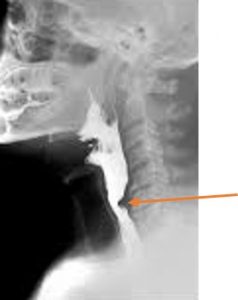The feeling of food sticking in the throat is a common complaint. People often worry of cancer being the cause. Whilst this is something that needs to be urgently excluded, the reality is that this is thankfully unusual.
As an Ear, Nose & Throat surgeon with a special interest in Head and Neck cancer, I am often asked to review patients with a such a problem and it is something I have a great deal of experience in. I am asked to deal specifically with problems of food sticking in the throat, the upper most part of the oesophagus (food pipe), rather than lower down in the oesophagus, which is normally dealt with by the gastroenterology doctors.
What are the causes of food sticking in the throat?
1. Cancer
By far the thing most people worry about, but the least common. Cancer in the hypopharynx (the bottom of the throat) occurs in less than 1 in 100,000 individuals. Risk factors include smoking and drinking. An urgent referral should be sought in order to rule this out.
2. Muscle spasm around the entrance of the oesophagus
The opening of the food tube is controlled by a muscle, the cricopharyngeus. When food enters the throat, the muscle automatically relaxes to allow food to pass smoothly down. Sometimes, this muscle fails to relax sufficiently so food has to pass through a tighter segment. This is extremely common in patients who complain of food sticking. It can be treated with a procedure performed endoscopically, through the mouth, under general anaesthetic (asleep) by dilating the tight muscle segment with special balloons that stretch the muscle in order to allow it to relax better.
3. Pharyngeal Pouch
The oesophagus should be a smooth, cylinder-shaped structure. It is however prone to weakness in its wall and when this happens a pouch can form. This is like a small hernia of the wall of the oesophagus. Think of it as an outpouching of the wall of the oesophagus which forms a cul-de-sac. In patients who have a pouch, some of the food will collect within it. This gives the sensation of food trapping on swallow. Sometimes, if the pouch is sufficiently large, food will actually regurgitate and the patient will bring up their food. This is not only distressing for the patient from a psychological point of view, it can, if severe enough, cause aspiration (food trickling down the wind pipe) and ultimately be a source of chest infections. Pharyngeal pouches can be treated surgically if it is appropriate to do so.
In simple terms, anything that causes a narrowing effect in the oesophagus can cause a restriction of swallow.
How is this investigated?
Any patient with a history of food sticking on swallow should be referred to an ENT surgeon for a thorough assessment in the outpatient department. A detailed history is taken to establish the precise circumstances of the difficulty in swallow and an endoscopic camera test is conducted at the same time. This involves a small camera being passed from the nose down to the throat in order to see if there are any worrying findings. This procedure is normally very well tolerated, lasts only about a minute and does not normally require any form of local anaesthetic. If this is normal, the patient is referred for a barium swallow. A barium swallow involves the patient drinking a small amount of barium liquid contrast, before a series of x-rays are taken to see how the fluid goes down. Muscle spasm and pouches are identified in this manner. Depending on the finding, management options are discussed.

A barium swallow demonstrating cricopharyngeal muscle spasm. The arrow is pointing to the indentation the muscle tightening is causing on the diameter of the upper oesophagus, causing it to narrow.


 One Ashford
One Ashford One Hatfield
One Hatfield